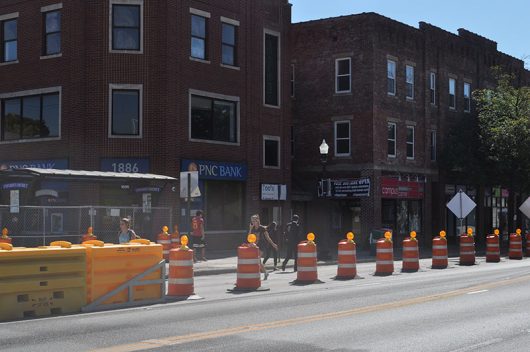
Students walk through construction near the intersection of East 16th Avenue and North High Street. Credit: Nick Roll | Campus Editor
For some Ohio State students and graduates, the changes happening on North High Street — such as the closing of Bernie’s Bagels and Deli, Chumley’s planned move to West Ninth Avenue, the impending closures of Too’s Under High and The O Patio and Pub — are the end of the world.
But David Kellough has seen it all before.
Though Kellough’s day job as a researcher at Ohio State’s College of Medicine focuses on moving science forward, his off-the-clock work is focused on taking a step back in time, as the University District’s unofficial resident historian, although he might dispute that title.
“Really, (I’m) more of a collector of stories,” said Kellough, an OSU alumnus from the ’80s. “This area, over the approximate century and a half it’s been around, there have been so many stories, with the lives lived here, with the things that have happened here, with the buildings that have risen and fallen. And I like to collect those stories and share them with people.”
He’s been doing just that on his website, UnivDistCol.com, since about 2006. He’s since expanded onto Twitter, Tumblr and Facebook.
Kellough, a University District resident, collects his stories mostly from public records, photographs and news clippings he can find at the Ohio History Connection or the Columbus Metropolitan Library. He takes time on Saturdays to see what he can dig up.
“The one constant on High Street is that there’s always been change,” he said.
Long’s Book Store, set to be demolished in October, was opened in 1912. Before the 1920s, North High Street was mostly residential. In the ’60s, the area around East 13th Avenue and North High Street was “the mecca of counterculture,” and in the ’70s, unrest led to riots, some of which were carried out on North High Street as well, Kellough said.
Kellough also said he sees parallels between the demolition of the old South Campus bars, which made the way for Gateway, and the impending 15th and High development, which is also displacing bars.
“The South Campus bars, that was High Street, when I was in college,” he said. “Profound things happened there. People found their favorite band there. People met their future wife. Somebody got drunk, and had to be helped home, and that guy became his best friend, and became his best man. And when he dies, he’ll be one of his pallbearers.”
But Kellough also said that romanticizing the past can be misleading.
“That said, (the South Campus bars) were crappy,” he said. “They were dirty, they were nasty, they were run-down. (There were) problems with crime, and mugging and all that.”
And while those bars are gone now, that “churn-through” of businesses affects every graduating class.
“I can’t help being of two minds,” he said, addressing his nostalgia but also his feelings that some areas of North High Street need redevelopment. “Once upon a time, people wanted love beads, another time they wanted dive bars, now, you know, somebody wants a really good cup of coffee.”
Kellough said his main concern about the 15th and High development is the unanswered question of whether the new retail spaces are filled with local businesses.
“They’re talking about the Wellington … the ground floor is going to be a Target. I can’t see anyone having fond memories of the campus Target,” he said. Target, as well as the NPR-affiliated radio station WOSU, are the first two businesses to have claimed retail and office space in the area of the new development.
For all the neighborhood’s change, however, Kellough said some things have more staying power than others.
“I do this neighborhood cleanup, and there used to be forty-ouncers and lotto tickets,” he said. “And now there’s craft beer and Starbucks cups. But there’s still a hell of a lot of Natty Light out there, and solo cups.”
Correction, Sept. 22: In an earlier version of this article, David Kellough’s website was mispelled.


